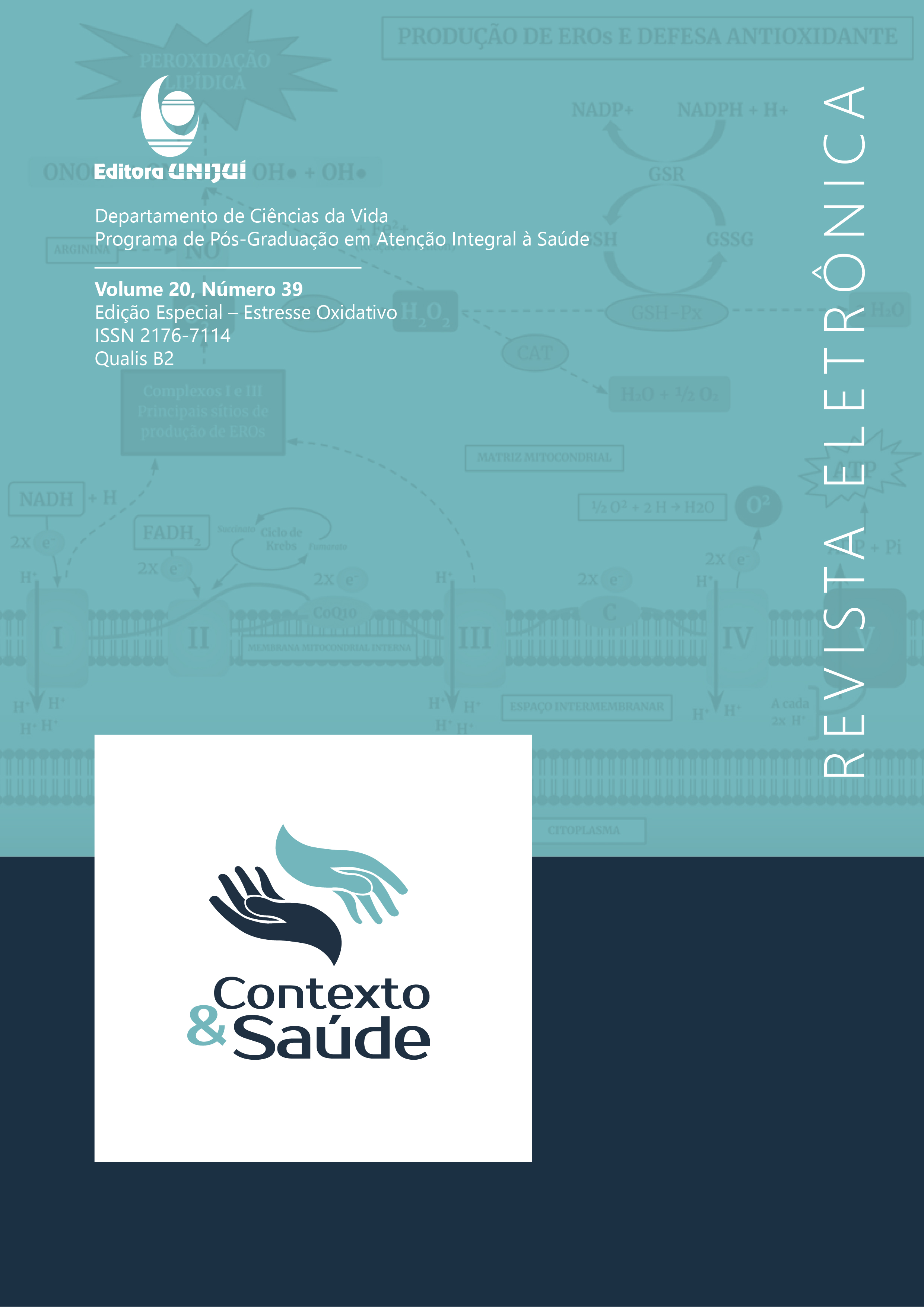EXTRATO HIDROETANÓLICO DE GENGIBRE (ZINGIBER OFFICINALE) INIBE A OXIDAÇÃO DA LIPOPROTEÍNA DE BAIXA DENSIDADE (LDL), IN VITRO
DOI:
https://doi.org/10.21527/2176-7114.2020.39.19-26Palavras-chave:
Antioxidante. Aterosclerose. Hipercolesterolemia. Produtos Naturais. Estresse Oxidativo.Resumo
Objetivo: Considerando a oxidação da LDL como fator crucial no desenvolvimento da aterosclerose, e as propriedades antioxidantes, anti-inflamatórias e anti-angiogênica do gengibre (Zingiber officinale), o objetivo do presente estudo é avaliar o conteúdo fitoquímico, mecanismos antioxidantes e o potencial do Extrato Hidroetanólico de Rizoma de Gengibre (EHEG), sobre a oxidação da lipoproteína de baixa densidade (LDL) de pacientes hipercolesterolêmicos, in vitro. Método: No EHEG foram avaliados teores de compostos fitoquímicos e mecanismos antioxidantes. A partir de amostras de soro dos pacientes (n=12), a fração LDL foi isolada, previamente tratada com EHEG (10 - 100 µg/ml) e submetidas à indução oxidativa com AAPH (10 mM). Após, o nível de lipoperoxidação foi medido. Resultados: O EHEG possui compostos fenólicos totais (357,68 ± 39,80 mg AG/g), flavonóides (30,37 ± 5,10 mg Q/g), taninos (51,99 ± 11,88 mg CA/g) e vitamina C (21,53 ± 1,43 mg Vit C/g), além de apresentar atividade removedora de radicais de NO (IC50 = 40,53 μg/mL) e de H2O2 (IC50 = 1,42 mg/mL). Quanto à inibição da oxidação de LDL, observou-se que o EHEG, a partir da concentração de 50 µg/ ml foi efetivo em reduzir o dano oxidativo causado pelo AAPH. Conclusão: O gengibre possui atividade protetora contra a formação de LDL oxidada, sugerindo que seus compostos fitoquímicos conferem-lhe atividade antioxidante, podendo ser efetivo na prevenção e/ou tratamento de doenças cardiovasculares, especialmente as relacionadas ao processo de aterosclerose.
Downloads
Publicado
Como Citar
Edição
Seção
Licença
Ao publicar na Revista Contexto & Saúde, os autores concordam com os seguintes termos:
Os trabalhos seguem a licença Creative Commons Atribuição 4.0 Internacional (CC BY 4.0), que permite:
Compartilhar — copiar e redistribuir o material em qualquer meio ou formato;
Adaptar — remixar, transformar e criar a partir do material para qualquer fim, inclusive comercial.
Essas permissões são irrevogáveis, desde que respeitados os seguintes termos:
Atribuição — os autores devem ser devidamente creditados, com link para a licença e indicação de eventuais alterações realizadas.
Sem restrições adicionais — não podem ser aplicadas condições legais ou tecnológicas que restrinjam o uso permitido pela licença.
Avisos:
A licença não se aplica a elementos em domínio público ou cobertos por exceções legais.
A licença não garante todos os direitos necessários para usos específicos (ex.: direitos de imagem, privacidade ou morais).
A revista não se responsabiliza pelas opiniões expressas nos artigos, que são de exclusiva responsabilidade dos autores. O Editor, com o apoio do Comitê Editorial, reserva-se o direito de sugerir ou solicitar modificações quando necessário.
Somente serão aceitos artigos científicos originais, com resultados de pesquisas de interesse que não tenham sido publicados nem submetidos simultaneamente a outro periódico com o mesmo objetivo.
A menção a marcas comerciais ou produtos específicos destina-se apenas à identificação, sem qualquer vínculo promocional por parte dos autores ou da revista.
Contrato de Licença (para artigos publicados a partir de setembro/2025): Os autores mantém os direitos autorais sobre seu artigo, e concedem à Revista Contexto & Saúde o direito de primeira publicação.

